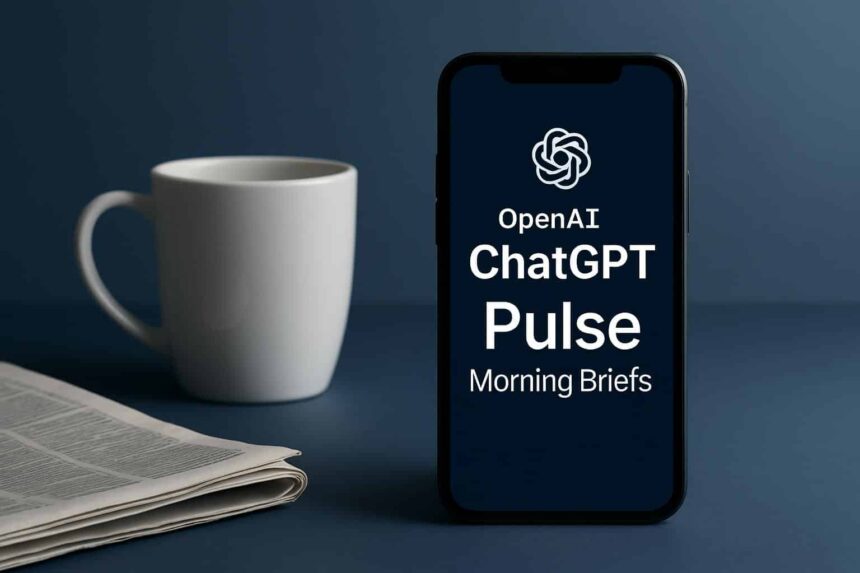SAN FRANCISCO — In an era where artificial intelligence has evolved from novelty to necessity, OpenAI is betting big on the idea that your chatbot shouldn’t just answer questions — it should anticipate them.
On Thursday, the company unveiled ChatGPT Pulse, a proactive feature designed to transform the ubiquitous AI assistant into a personal morning herald, delivering tailored daily briefings before you’ve even brewed your coffee.
Available initially as a preview for subscribers to its $200-per-month Pro plan on mobile devices, ChatGPT Pulse marks a pivotal shift toward “agentic AI,” where models don’t wait for prompts but act like vigilant aides, sifting through your digital life to serve up insights.
Imagine opening your phone to a series of crisp, visual cards — not endless notifications, but a curated digest of five to 10 items that feel eerily prescient. Pulse draws from your past conversations, saved preferences, and optional integrations with apps like Gmail and Google Calendar to generate these updates overnight.
“This is the first step toward a more useful ChatGPT that proactively brings you what you need, helping you make more progress so you can get back to your life,” OpenAI wrote in its announcement blog post. For Pro users, it appears as a new tab in the ChatGPT app, refreshing daily with content that vanishes after 24 hours unless saved or queried further.
ChatGPT Pulse Flips the Script
At its core, ChatGPT Pulse flips the script on reactive AI. Where traditional ChatGPT responds to your queries — “What’s the weather?” or “Draft an email” — Pulse initiates the conversation. It analyzes chat history and memory (which must be enabled) to identify patterns and gaps. If you’ve been brainstorming urban gardening tips, for instance, it might surface seasonal advice on heirloom tomatoes or pest control innovations, complete with AI-generated images and sourced links.
Connect your calendar, and it could preemptively draft a meeting agenda, flag a forgotten birthday gift, or recommend family-friendly hikes based on an upcoming trip to Sedona, Arizona. Gmail integration might pull travel confirmations to suggest local eateries that align with your dietary preferences from prior chats.
Users aren’t passive recipients; curation is key. A “curate” button lets you request specifics — “Friday roundup of Bay Area tech events” or “Tennis pro updates tomorrow” — while thumbs-up/down feedback refines future pulses.
Over time, this machine-learning loop makes the feature more attuned, evolving from generic summaries to hyper-personalized nudges like Pilates routines for a post-travel recovery day or fuel-stop plans for a birthday hike. Safety nets are baked in: All topics undergo policy checks to filter harmful content, and app connections are opt-in, toggleable in settings.
Sam Altman Gushes
OpenAI’s CEO Sam Altman, rarely one to gush, called ChatGPT his “favorite feature of ChatGPT so far” in a post on X, underscoring its potential to make AI feel less like a tool and more like a teammate.
The rollout aligns with broader industry trends toward asynchronous AI, where models like those from Google and Anthropic also experiment with background research and autonomous actions.
OpenAI tested Pulse with college students via its ChatGPT Lab, finding that utility spiked once users guided its focus — a nod to the feature’s learning curve. Plans call for expansion to Plus subscribers ($20/month) soon, with free users on the horizon, though computing demands may delay that.
Yet, as with any leap in personalization, tech critics are divided, praising the innovation while waving red flags on privacy and reliability. Kyle Wiggers at TechCrunch hailed it as a “broader shift” toward AI that “works for users asynchronously,” potentially challenging news aggregators like Google News or Flipboard by curating feeds without the doom-scroll trap.
In a demo, OpenAI product lead Adam Fry showcased cards for Arsenal soccer updates, Halloween costume ideas, and toddler itineraries — glimpses of a world where AI anticipates family chaos. Tom’s Guide’s Amanda Caswell echoed the enthusiasm, calling it a “game-changer” that could “keep you chatting” by starting conversations, especially for busy parents juggling emails and schedules.
“Pulse is changing that by taking the assistance a step further and anticipating your needs,” she wrote, suggesting it might even supplant morning news apps.
On the flip side, privacy hawks are sounding alarms. The Verge’s Hayden Field described Pulse as OpenAI’s “latest personalization play,” one that prompts users to share transcripts, phone activity, and app data — raising spectres of echo chambers or reinforced biases, particularly for mental health topics.
Christina Kaplan, OpenAI’s personalization lead, demoed a pulse factoring in her running habits for a London itinerary, but Field noted the “training data implications” mirror regular chats, with safety filtrations in place yet unproven at scale.
Ars Technica’s Benj Edwards pointed to the feature’s “highly variable” success rate, rooted in large language models’ pattern-based flaws — it might ace sports recaps but flub nuanced advice, or worse, suggest tips for “completed projects.” “Its success rate is highly variable based on the topic,” Edwards cautioned, urging users to temper expectations.
Critics also decry the paywall. Reddit’s r/OpenAI thread lit up with frustration: “Paying more for less. ChatGPT is getting worse, not better,” one user griped, while another quipped it’s “not $200/month interesting” without a mid-tier option. Engadget’s Rachel England framed it wryly: “ChatGPT already tries to answer all your questions.
Now it’s trying to answer questions before you ask them,” but questioned if the “bulletin to start the day” justifies the premium price amid OpenAI’s server shortages. Gizmodo’s report amplified concerns over data hunger: Pulse “will have to scour through their chat history, email, and calendar,” potentially turning users into unwitting informants.
On X, reactions ranged from hype to heresy. Investor Blake Robbins predicted Pulse as OpenAI’s ad-testing ground, quarantining AI slop like Meta’s Vibes feed. Japanese user @ai_kanegon celebrated the “AI secretary evolution,” while @MaxdMeme joked it’s an AI that “stalks your interests daily.” Broader discourse, per semantic searches, buzzes with excitement over its potential to kill Google searches — Altman himself has ditched them — but frets over “creepy overreach.”
For now, ChatGPT Pulse is a mobile-exclusive preview, limited to iOS and Android, with web/desktop versions TBD. OpenAI envisions it expanding to multi-app orchestration — booking dinners, drafting emails — but that hinges on agentic leaps and trust-building. As Fidji Simo, OpenAI’s applications CEO, put it: “The next frontier is agents: AI assistants that can take action on your behalf.”
In a world bombarded by information, ChatGPT Pulse promises to be the filter we’ve craved — or the watcher we’ve feared. Early adopters, proceed with cautious delight. For the rest, it’s a tantalizing tease of AI’s next act: not just smart, but solicitous.














